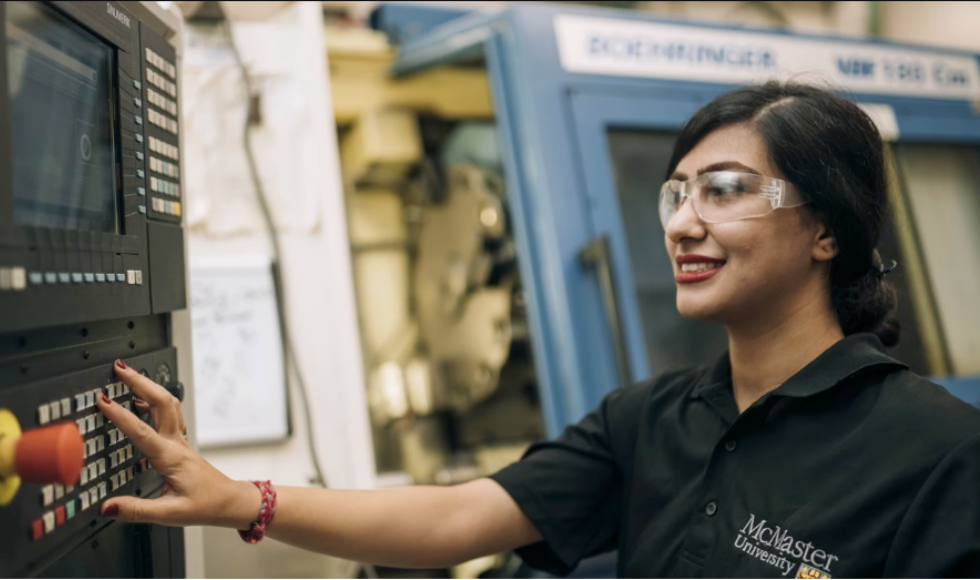Manufacturing research gets a 5G boost at new McMaster facility

BY Kim Arnott for the Faculty of Engineering
December 21, 2022
How can the marvels of a 5G network change the face of Canadian manufacturing? That’s the question researchers will be exploring at McMaster’s new, 21,000-square-foot advanced manufacturing facility, thanks to a partnership with Canadian technology provider TERAGO.
For more than two decades, the McMaster Manufacturing Research Institute (MMRI) has focused on finding solutions to real-world challenges faced by Canadian manufacturers.
With the move to a new “industry-scale” facility — equipped with a cutting-edge 5G millimeter wave private network — researchers can now focus on how data might transform the shop floor, says MMRI director Stephen Veldhuis, the Braley-Orlick Chair in Advanced Manufacturing Engineering.
The high-speed, low-latency connectivity of TERAGO’s 5G network will allow wireless sensors to collect a range of data from manufacturing machines.
“We can now bring the data into advanced analytics, explore the challenges and opportunities, and demonstrate the possibilities to industry,” Veldhuis says.
The benefits of technologies like machine learning, augmented reality, remote automation and edge computing will be in reach of the manufacturing sector, with the potential for the type of innovations that have reshaped many sectors of the economy.
“The future is data driven,” Veldhuise says. “And if Industry 4.0 is about data moving around, then 5G is the highway for it.”
Thanks to the partnership with TERAGO, McMaster is the first university in the country to adopt a private 5G network.
The company is excited to accelerate the development of Canada’s advanced manufacturing and logistics industries, says Blake Wetzel,TERAGO’s Chief Operating Officer.
“Working in partnership with McMaster allows us to develop use cases and measure the impact for Canadian enterprises and to solve real life, business and societal problems, together,” he says. “This research project is just the beginning of an ongoing relationship and I look forward to develop solutions that will benefit Canadians from our collaboration.”
The 5G technology will open up new research possibilities that simply weren’t feasible in the past, with opportunities to improve manufacturing processes, products and productivity. It will also offer graduate students a chance to work on ground-breaking research that could help shape tomorrow’s factories.
For master’s candidate Eden Lazar, the network will advance his research into condition-based monitoring research, as he evaluates how various types of wireless sensors can track the health and performance of machinery.
“I would say I feel like a kid in a playground,” he says. “We’re at the forefront of new research.”
Students will benefit from early exposure to novel and challenging issues, while working with cutting-edge technology, says Veldhuis.
“It’s a gift to be able to see a problem and then be able to solve that problem. World class research is led by people who are exposed to challenges and given the chance to innovate and solve them.”
The new MMRI facility is strategically located alongside the McMaster Automotive Resource Centre (MARC) and a soon-to-be completed biotech research facility.
Proximity to innovation hubs will open the door to integrated interdisciplinary research, with the aim of solving globally significant challenges, says John Preston, Associate Dean, Research, Innovation and External Relations with the Faculty of Engineering.
“We’re confident that our partnership with TERAGO will not only generate robust technologies that address real world problems, but also attract other strategic partners seeking to spur efficiency and competitiveness in Canada’s industrial sector.”


